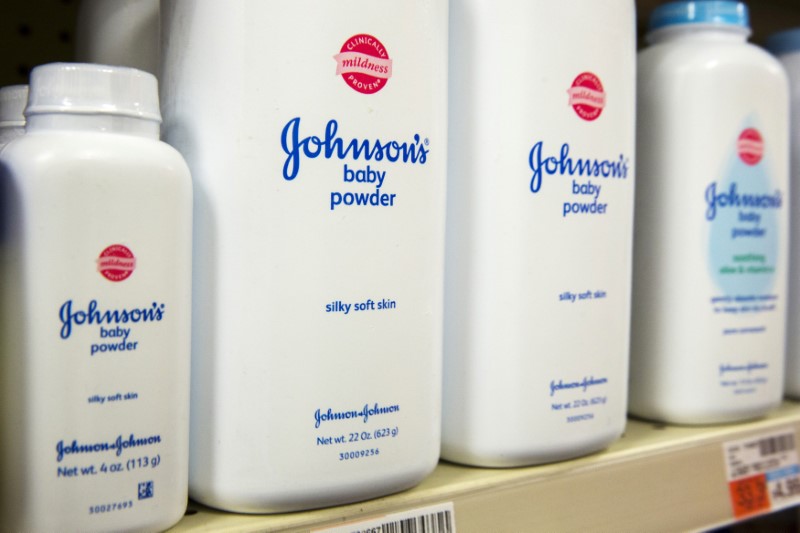By Nate Raymond
(Reuters) - Johnson & Johnson (NYSE:JNJ) is seizing upon a U.S. Supreme Court ruling from Monday limiting where injury lawsuits can be filed to fight off claims it failed to warn women that talcum powder could cause ovarian cancer.
New Jersey-based J&J has been battling a series of lawsuits over its talc-based products, including Johnson's Baby Powder, brought by around 5,950 women and their families. The company denies any link between talc and cancer.
A fifth of the plaintiffs have cases pending in state court in St. Louis, where juries in four trials have hit J&J and a talc supplier with $307 million in verdicts. Those four cases and most of the others on the St. Louis docket involve out-of-state plaintiffs suing an out-of-state company.
On Monday, the Supreme Court ruled 8-1 in a case involving Bristol-Myers Squibb Co that state courts cannot hear claims against companies that are not based in the state when the alleged injuries did not occur there.
The ruling immediately led a St. Louis judge at J&J's urging to declare a mistrial in the latest talc case, in which two of the three women at issue were from out of state. It also could imperil prior verdicts and cases that have yet to go to trial.
"We believe the recent U.S. Supreme Court ruling on the Bristol-Myers Squibb matter requires reversal of the talc cases that are currently under appeal in St. Louis," J&J said in a statement.
The question of where such lawsuits can be filed has been the subject of fierce debate.
The business community has argued plaintiffs should not be allowed to shop around for the most favorable court to bring lawsuits, while injured parties claim corporations are trying to deny them access to justice.
Along with talc cases, large-scale litigation alleging injuries from Bayer (DE:BAYGN) AG's Essure birth control device in Missouri and California and GlaxoSmithKline's antidepressant Paxil in California and Illinois are examples of other cases where defendants could utilize the Supreme Court decision.
Although he declared a mistrial on Monday, St. Louis Circuit Judge Rex Burlison left the door open for the plaintiffs to argue they still have jurisdiction.
Plaintiffs lawyer Ted Meadows said he would argue the St. Louis court still had jurisdiction based on a Missouri-based bottler J&J used to package its talc products, which he said would create a sufficient connection to the state.
"It's very disappointing to mistry a case because the Supreme Court changed the rules on us," said Meadows.
The lawsuit decided by the high court on Monday involved claims against Bristol-Myers and California-based drug distributor McKesson Corp (NYSE:MCK) by 86 California residents and 575 non-Californians over the blood thinner Plavix.
Beyond Monday's mistrial, the Supreme Court's ruling could bolster a pending appeal by J&J of a $72 million verdict in favor of the family of Alabama resident Jacqueline Fox, who died in 2015. A Missouri appeals court had said in May it would wait until the Supreme Court issued its decision to decide the appeal.
J&J has won only one of the five trials so far in Missouri. It previously sought to move talc cases out of St. Louis, but the Missouri Supreme Court in January denied its bid.
The company has also cast the St. Louis court as overly plaintiff-friendly and has allowed evidence linking talc to cancer that was rejected by a New Jersey state court judge overseeing over 200 talc cases. The plaintiffs are appealing.
The talc verdicts against J&J led the business-friendly American Tort Reform Association last year to declare the St. Louis state court the nation's top "Judicial Hellhole."
Now J&J could try to use the Supreme Court ruling to dismiss many of the cases it faces in Missouri, according to legal experts.
Corporations facing a large volume of cases in venues chosen by plaintiffs will likely cite the Supreme Court to try to dismiss those claims, said Rusty Perdew, a defense lawyer at the law firm Locke Lord.
"You have a bunch of defendants who can go back and say, 'Judge, you got that wrong and you're going to have to dismiss claims by all those plaintiffs,'" he said.
(This story was corrected to show that Perdew was speaking about corporations in general, not J&J, in next-to-last paragraph.)
